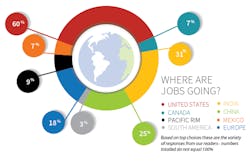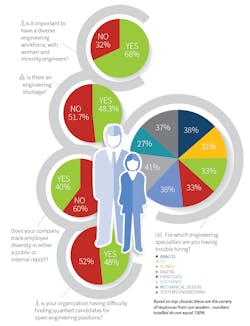For electrical engineers today, productivity is power. Asked to do more than ever with fewer resources, engineers with a broad range of expertise can command higher salaries, compete for limited jobs, and carve out a place in an industry interwoven with outsourcing.
Among survey respondents, just under 10% are actively seeking a new position, while more than half of their companies are at a hiring status quo.
“We can’t get people to stay,” said one respondent. Others added that employers are hiring young engineers who earn lower salaries but need additional training. At the same time, they are looking for those with broad expertise in fields like analog and systems engineering, which are scarce commodities these days.
Outsourcing remains a concern for engineers in our survey, who see jobs going to Asia and other parts of the United States.
Employers have trimmed headcounts in recent years, respondents said, and it is not clear that new jobs are filling the void. The Bureau of Labor Statistics says that there were 315,900 jobs for electrical engineers in 2015, and that the profession would see zero growth in the United States in the next seven years.
Nonetheless, companies are still willing to pay well for the right engineering talent. This year, the average base salary for electrical engineers dipped to $104,996 from $106,250 in 2016. That is still higher than the $99,514 that engineers earned on average in 2015.
Yet as salaries continue to rebound from the economic recession, engineers are grappling with lukewarm attitudes from employers. This year, only 31.3% of respondents feel that their company is more focused on employee retention than last year, down from around 55% of engineers in 2011.
“My employer is hoping to improve their value proposition for young people,” said one engineer who filled out the survey. “But they need to update their benefits to better align with the shift from one employer over a career to multiple employers over one’s working life.”
Something is wrong somewhere, though. Around 49% of respondents said that their companies are having difficulty filling open positions. The most elusive engineers are in analog and software, which 38.7% and 41.1% of engineers said that their companies were struggling to hire, respectively.
At the same time, however, almost nine out of every 10 engineers would recommend the profession to young people. They say that a fulfilling career await talented engineers who survive an education system not geared for them, as well as the side effects of an imperfect work visa program in the United States.
Around 51% of respondents believe an engineering shortage exists, but others contend that employers are being too picky. And engineers—who work around 54 hours per week in and out of the office—are still strapped for time to learn new technologies, which is still the top concern for most engineers.
One manager echoed a common—and almost contradictory—observation about the job market: “We need generalists with lots of experience in just the right specialties.”






